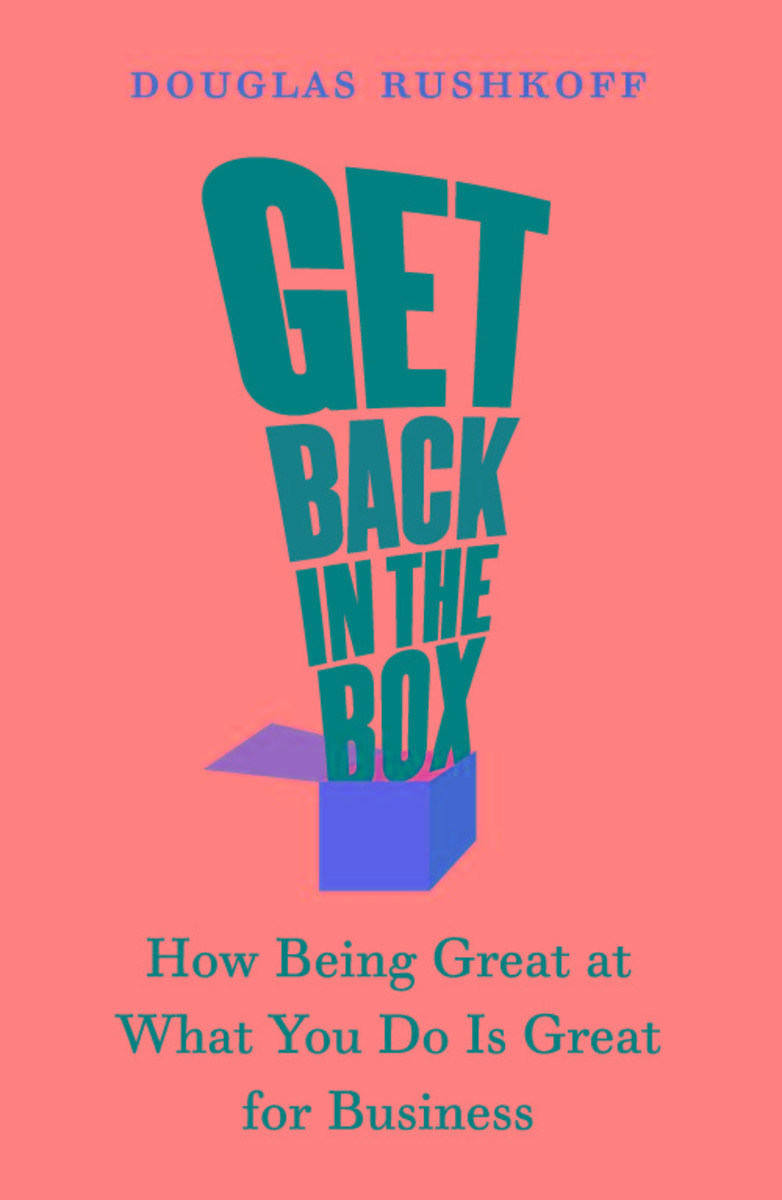
Get Back in the Box
¥84.28
Douglas Rushkoff was one of the first social commentators to identify the new culture around the internet. He has spent nearly a decade advising companies on the ways they can re-orient their businesses to the transformations the internet has caused. Through his speaking and consulting, Rushkoff has discovered an important and unrecognized shift in American business. Too many companies are panicked and operating in survival mode when the worst of the crisis has already passed. Likening the internet transformation to the intellectual and technological ferment of the Enlightment, Rushkoff suggests we have a remarkable opportunity to re-integrate our new perspective with the work we actually do. Instead of running around trying to "think out of the box," Rushkoff demonstrates, now is the time to "get back in the box" and improve the way we do our jobs, run our operations and drive innovation from the ground up. Combining stories gleaned from his consulting with a thrilling tour of history's dramatic moments and clever readings of cultural shift we've just experienced, Rushkoff offers a compelling vision of the simple and effective ways businesses can re-invigorate themselves.

Ugly Beauty
¥151.53
The gripping story of Helena Rubinstein, Eugne Schueller, and the dark side of the beauty business they helped to create Helena Rubinstein and L'Oral's Eugne Schueller both started out in the beauty business during the first years of the twentieth century, and, by the time World War II broke out, had come to dominate it. However, their motivations could not have been more different. Rubinstein, a Polish Jew, claimed the world of paid work for women, and working women's enthusiasm for her products made her the first self-made female millionaire. Schueller, a French conservative in the Henry Ford mold, thought women belonged in the home, and during the Nazi Occupation he used his company as a source of cash to buy economic and political influence.Schueller eventually won the long fight for supremacy: in 1988 his company swallowed Rubinstein's. But the victory cost him his reputation when, in the wake of the takeover, he was exposed as a Nazi collaborator. Deepening the scandal, his wartime activities were shown to have been abetted and condoned by a cadre of young men who, by the time the news broke, had scaled the peaks of wealth and power in postwar France.By then Schueller and Rubinstein were both long dead. But cultural historian and biographer Ruth Brandon argues that the battle they began continues to this day. She examines their conflict to ask important contemporary questions about beauty standards and the often murky intersection of individual political aims and the role of business. Filled with remarkable twists, turns, and larger-than-life characters, Ugly Beauty is a riveting true story about what lies beneath the flawless exterior of the cosmetics industry.

Hidden in Plain Sight
¥160.56
A global-innovation expert offers a new perspective on how consumers think and how to develop products and services that affect their everyday lives.Who are your next customers not just the ones you are serving today but the ones you'll need three, five, or ten years from nowHow do you figure out what goods and services will attract them in the future before your competitors do?According to Jan Chipchase whom Fast Company has called the James Bond of design research and Fortune has called the Indiana Jones of technology for the developing world most of the clues are right in front of us. The key is learning to see the ordinary in a revolutionary new way. As the executive creative director of Global Insights at frog, an award-winning global design and innovation company, Chipchase draws on everyday objects and patterns to show us how to see the world differently, from making a phone call to filling up a gas tank to ascertaining whether it's actually half-and-half you're pouring into your coffee. Chipchase is always looking for opportunities gaps, anomalies, and contradictions that will give his clients, some of the world's largest and most successful companies, a distinct competitive advantage, whether they're delivering the most low-tech bar of soap or the most high-tech wireless network.In Hidden in Plain Sight, Chipchase takes readers on his journeys around the globe and shares his methods for identifying the unmet needs of customers. No matter where he stops whether Cleveland or Kabul his goals are the same: to spot and decode the routines of daily life and to help readers use the very same tools that he and his team use to see, and capitalize upon, what is hidden in plain sight today to create businesses tomorrow.

FIRE
¥160.56
Why do some projects deliver under budget and ahead of schedule, while others cost more and take longer than expectedMore important, which products work better: the quick and thrifty or the slow and expensive?In a story-filled blend of quirky pop culture and practical engineering insight, Dan Ward's F.I.R.E. answers those questions and more. Ward's extensive research and firsthand experience show how the world's top technologists consistently deliver best-in-class results on shoestring budgets and cannonball schedules, and using skeleton crews.This remarkable book will make you laugh, make you think, and equip you to leverage the power of constraints. Discover the secrets of F.I.R.E. and learn how to:Build strategies for speed that enhance accountability and ensure your products are well aligned with the market's needs.Design your organizations, products, and processes with thrift in mind, solving problems with intellectual capital, not financial capital.Unleash the power of small budgets and small teams, using short schedules, short meetings, and short documents.Streamline your designs and cut through unnecessary, unproductive layers of bureaucracy.But this is not just a book about how to win. With unflinching candor, Ward shows how the F.I.R.E. method, even when followed wisely and well, can result in a flop. Taking a deep look at several negative outcomes, he shows how to make failures optimal rather than epic.F.I.R.E. provides strategic concepts for leaders, decision-making principles for managers, and practical tools for people working on anything from spacecraft and fighter jets to websites and children's toys. Technology professionals and curious amateurs alike will come away with a deeper understanding of effective product design. Plus, there's a funny story about a dishwasher that just may change the way you buy major appliances.
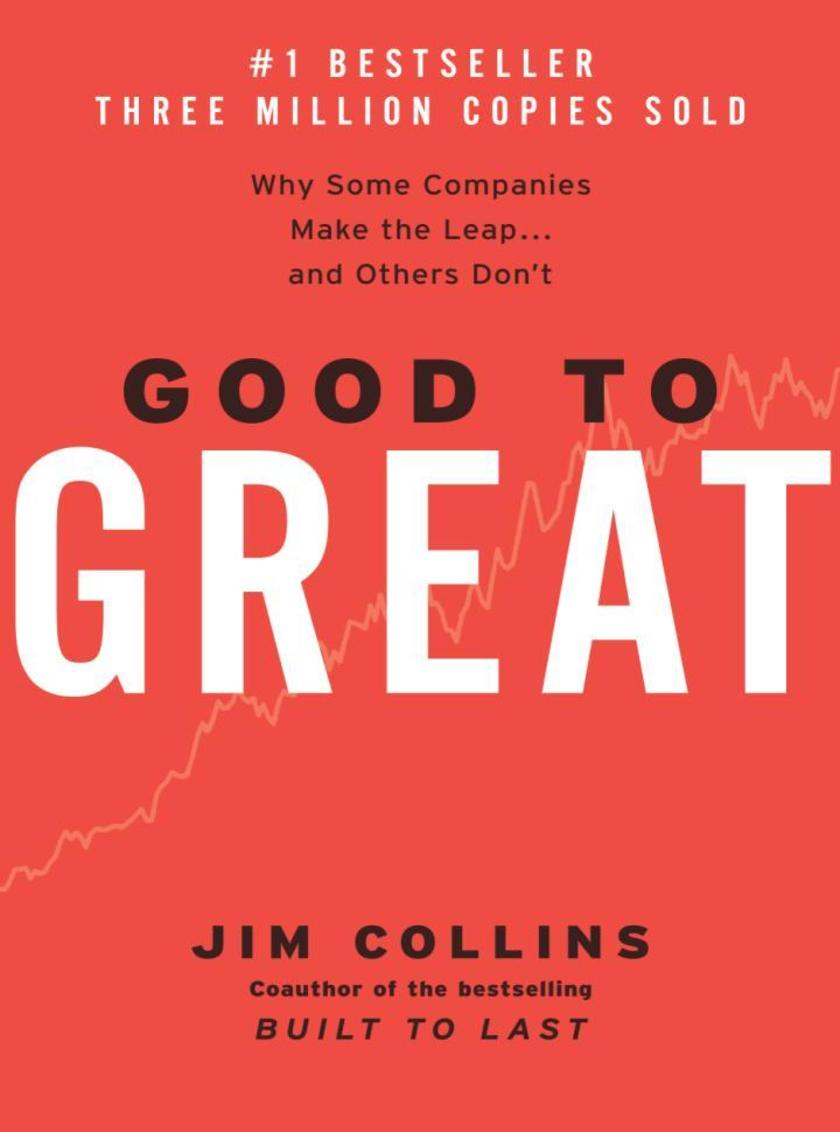
Good to Great
¥182.47
The Challenge Built to Last, the defining management study of the nineties, showed how great companies triumph over time and how long-term sustained performance can be engineered into the DNA of an enterprise from the verybeginning. But what about the company that is not born with great DNAHow can good companies, mediocre companies, even bad companies achieve enduring greatnessThe Study For years, this question preyed on the mind of Jim Collins. Are there companies that defy gravity and convert long-term mediocrity or worse into long-term superiorityAnd if so, what are the universal distinguishing characteristics that cause a company to go from good to greatThe Standards Using tough benchmarks, Collins and his research team identified a set of elite companies that made the leap to great results and sustained those results for at least fifteen years. How greatAfter the leap, the good-to-great companies generated cumulative stock returns that beat the general stock market by an average of seven times in fifteen years, better than twice the results delivered by a composite index of the world's greatest companies, including Coca-Cola, Intel, General Electric, and Merck.The Comparisons The research team contrasted the good-to-great companies with a carefully selected set of comparison companies that failed to make the leap from good to great. What was differentWhy did one set of companies become truly great performers while the other set remained only goodOver five years, the team analyzed the histories of all twenty-eight companies in the study. After sifting through mountains of data and thousands of pages of interviews, Collins and his crew discovered the key determinants of greatness -- why some companies make the leap and others don't. The Findings The findings of the Good to Great study will surprise many readers and shed light on virtually every area of management strategy and practice. The findings include: Level 5 Leaders: The research team was shocked to discover the type of leadership required to achieve greatness. The Hedgehog Concept (Simplicity within the Three Circles): To go from good to great requires transcending the curse of competence. A Culture of Discipline: When you combine a culture of discipline with an ethic of entrepreneurship, you get the magical alchemy of great results. Technology Accelerators: Good-to-great companies think differently about the role of technology. The Flywheel and the Doom Loop: Those who launch radical change programs and wrenching restructurings will almost certainly fail to make the leap. Some of the key concepts discerned in the study, comments Jim Collins, "fly in the face of our modern business culture and will, quite frankly, upset some people.Perhaps, but who can afford to ignore these findings?
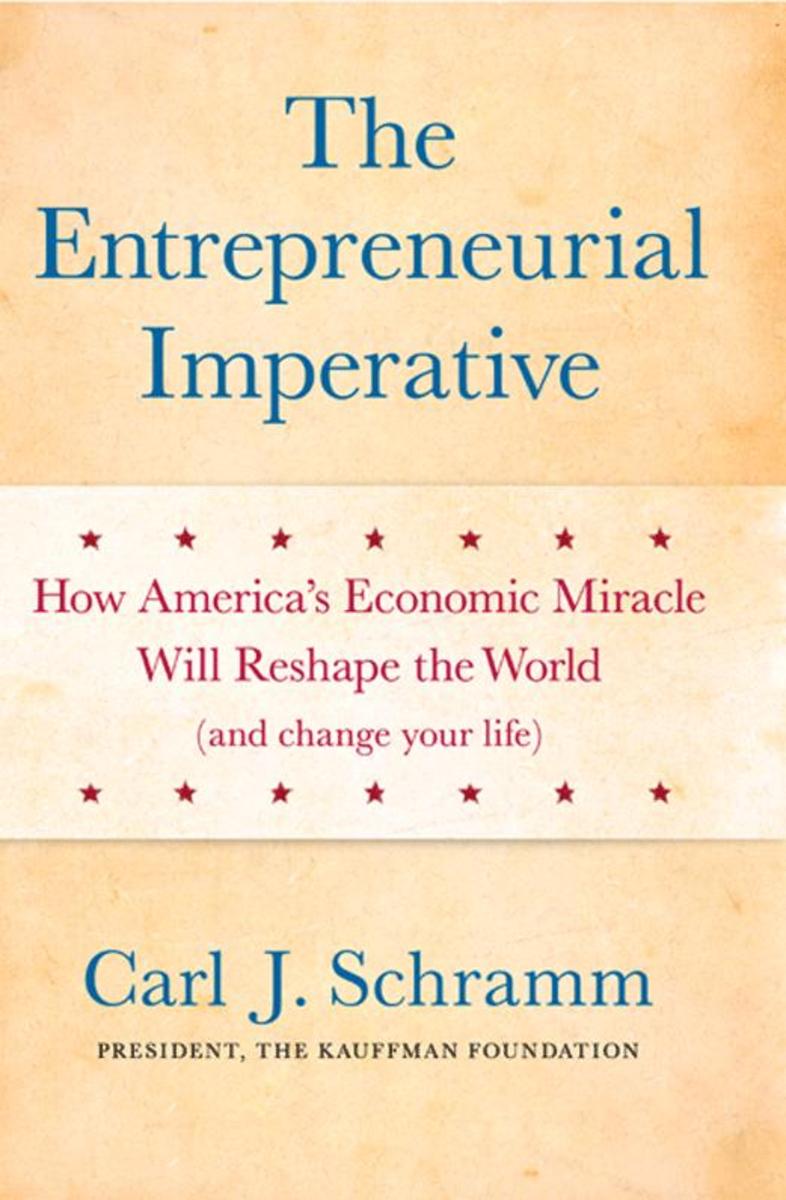
The Entrepreneurial Imperative
¥138.19
In 2004, Carl Schramm, president of the Kauffman Foundation, the world's leading foundation for entrepreneurship, published a groundbreaking essay with a radical premise: that Americans literally have no conception of the secret that truly underlies our economic success, and that for the United States to survive and continue to lead the world's economy, it is imperative we learn to understand and employ that secret.The secret that has led the American economy to become the world's strongestOur unparalleled skill as entrepreneurs. As Schramm compellingly shows in this sweeping manifesto, entrepreneurship alone not anything else can give America the necessary leverage to remain an economic superpower. Not technology, since everyone now has the same technology, or access to it. Not education we are years behind other nations in this area. Not basic manufacturing, long since moved overseas from the United States. And not capital markets, now truly global entities.Drawing on detailed research conducted by the Kauffman Foundation and on his decades of experience as an entrepreneur himself and as a leader and mentor to other entrepreneurs, Schramm persuasively demonstrates in detail what this entrepreneurial imperative means for the way we run universities and foundations, lead companies, make personal job decisions, and even conduct our foreign affairs. The Entrepreneurial Imperative will change not only the way our government, corporations, and nonprofits operate, but also our day-to-day lives as working Americans.
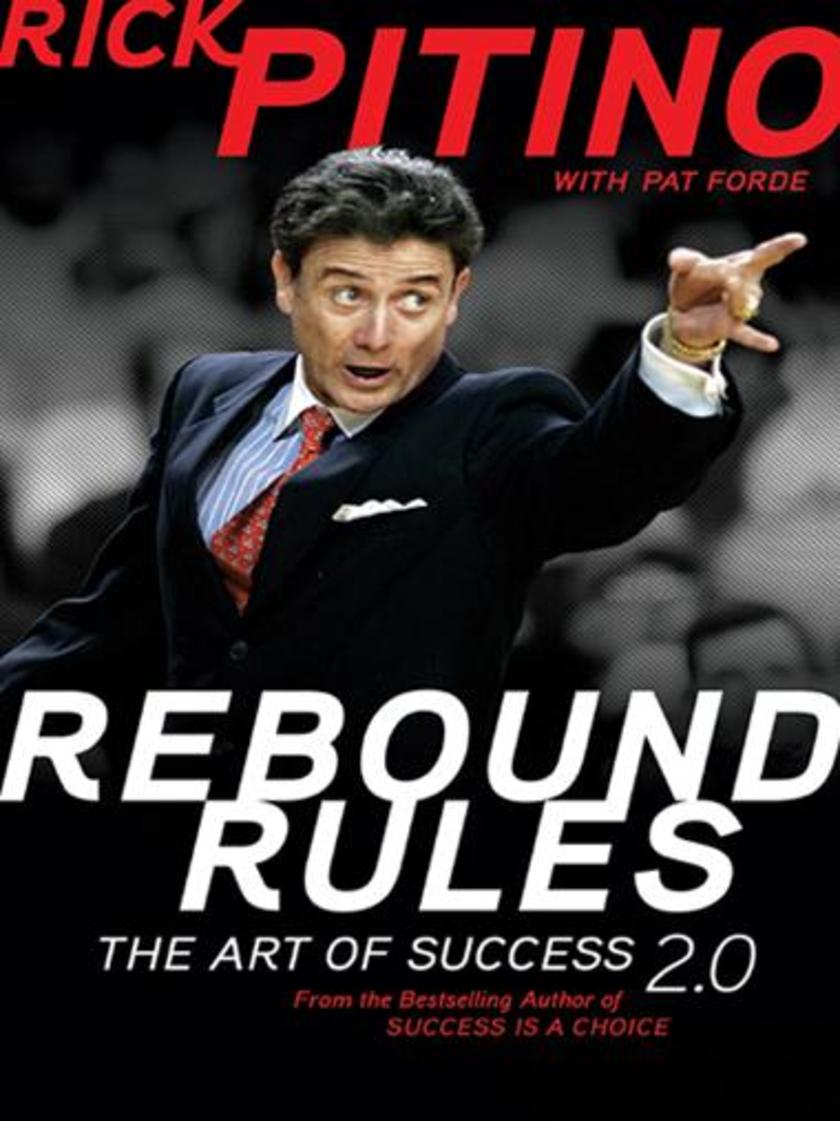
Rebound Rules
¥95.39
Rick Pitino is a basketball icon: the only coach in college history to lead three different schools to the Final Four, the winner of the 1996 NCAA championship, the owner of a sparkling career record, a bestselling author, and a lock for the College Basketball Hall of Fame. Yet Pitino's journey has not been without life-altering adversity: He's experienced profound personal and professional losses. In 2001, after three losing seasons as coach and president of the Boston Celtics, Pitino resigned, walking away from the $23 million left in his contract. And while recovering from the only breakdown in his extraordinary basketball career, Pitino who had previously suffered the devastating loss of his infant son, Daniel endured additional tragedies: His brother-in-law and best friend Billy Minardi, a trader at Cantor Fitzgerald, perished in the World Trade Center attacks of 9/11, less than a year after another brother-in-law had been fatally struck by a taxi. Pitino writes, "From that point on, my life changed forever. Nothing will ever be the same."This realization gave Pitino a new perspective. With it, the innovative leader felt the freedom to act even more dynamically than he ever had in the past. Returning to college basketball, he has rebuilt and revitalized the storied program at Louisville, guiding the Cardinals to a history-making Final Four appearance in 2005 that stamped him the only coach in history to take three schools that far. And in 2008, he rallied an injury-plagued Louisville team from a disappointing start and led it to the Elite Eight, setting the stage for greater success to come.The failures and tragedies he recounts make this book unique. More than just a recitation of what works and why, it's about how to succeed after you've failed; how to pick yourself up after being knocked down; and how to reframe yourself and see the world in a new light. This is a comeback story, a manual for overcoming life's difficulties. Pitino has experienced success as an author with his tremendously popular books Success Is a Choice and Lead to Succeed, but in Rebound Rules: The Art of Success 2.0, he's crafted a book that's more deeply personal, more inspiring, more practical, and more powerful than any he's written before.

Force of Nature
¥157.15
What happens when a renowned river guide teams up with the CEO of one of the largest and least Earth-friendly corporations in the worldWhen it's former Wal-Mart CEO H. Lee Scott and white-water expert turned sustainability consultant Jib Ellison, the result is nothing less than a green business revolution.Wal-Mart long the target of local businesses, labor advocates, and environmentalists who deplore its outsourced, big-box methods has embraced an unprecedented green makeover, which is now spreading worldwide. The retail giant that rose from Sam Walton's Ozarks dime store is leveraging the power of 200 million weekly customers to drive waste, toxics, and carbon emissions out of its stores and products. Neither an act of charity nor an empty greenwash, Wal-Mart's green move reflects its river guide's simple, compelling philosophy: that the most sustainable, clean, energy-efficient, and waste-free company will beat its competitors every time. Not just in some distant, utopian future but today. From energy conservation, recycling, and hybrid trucks to reduced packaging and partnerships with environmentalists it once met only in court, Wal-Mart has used sustainability to boost its bottom line even in a tough economy belying the age-old claim that going green kills jobs and profits. Now the global apparel business, the American dairy industry, big agriculture, and even Wall Street are following Wal-Mart's lead, along with the 100,000 manufacturers whose products must become more sustainable to remain on Wal-Mart's shelves. Here Pulitzer Prize winner and bestselling author Edward Humes charts the course of this unlikely second industrial revolution, in which corporate titans who once believed profit and planet must be at odds are learning that the best business just may be a force of nature.
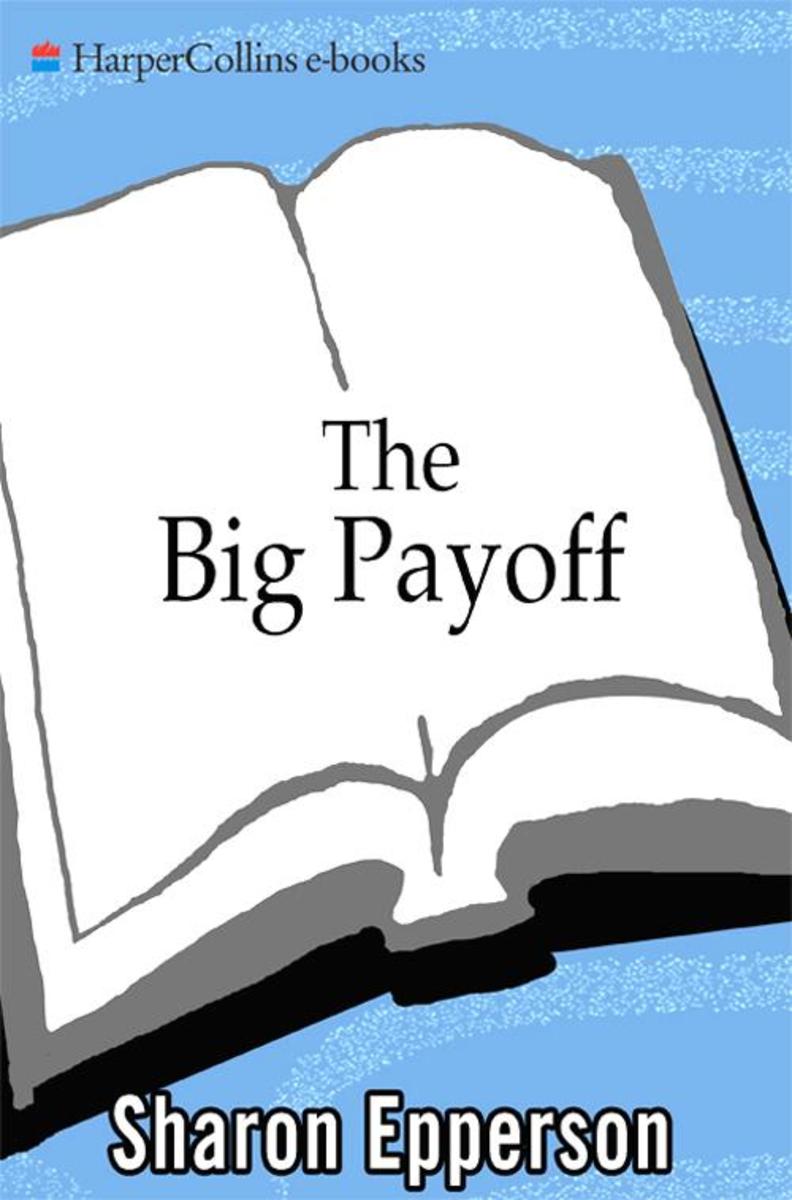
HarperCollins e-books
¥128.85
Middle-class couples are working harder than ever. So why are they finding it more difficult to finance their homes, send their kids to college, and save toward retirement?Couples who are strapped for time and weighed down by costly fixed expenses need more than a personal finance pep talk: They need a plan. In The Big Payoff, CNBC correspondent Sharon Epperson lays out a nuts-and-bolts program that couples of all ages can use to realize their financial dreams. From stretching your budget and investing wisely in your home to protecting your family's money and building wealth over the years, The Big Payoff offers a concise bounty of precious information and practical steps toward financial wellness.Epperson begins by showing couples how to communicate better about money. She helps them realize that the same qualities needed to create a lasting relationship understanding, compromise, and patience are vital when it comes to building a secure financial future. Every important decision couples make, whether it's buying a home, having kids, changing jobs, or preparing for retirement, will inevitably involve a discussion about money, and Epperson teaches them how to handle finances with a cool hand while keeping the marriage vibrant and healthy. In addition, she empowers couples to take money matters into their own hands and shows them that by taking control of their finances, they can stop fretting about cash and start focusing on the important things in life.Each of the following chapters is designed to get partners talking and thinking about their financial life together. In eight easy-to-understand steps, Epperson unpacks the various options for saving money; creating emergency, retirement, and college savings plans; investing in a home; choosing the right life and health insurance; and drafting an estate plan. A wife and mother of two herself, Epperson knows a thing or two about the pitfalls of financial planning and doses her advice with plenty of humorous anecdotes, hard-earned experience, and down-to-earth language. Additionally, through helpful worksheets and exercises, The Big Payoff helps readers customize a plan that will work best for them and reap the most payback.It's never too late or too early to start, and now is the best time to start planning. Whether you are newlyweds or fast-approaching retirement, just starting a family or soon to be empty-nesters, this book is for you. After working hard to provide for your family, the reward of discovering your financial strength will be the peace of mind to enjoy your marriage, your family, and the rest of your lives together.

HarperCollins e-books
¥140.29
Whether it was a Ginsu knife, George Foreman Grill, Tony Robbins' motivational book, kitchen device by Ron Popeil, or any of the countless other famous products that have been marketed on infomercials over the years, admit it: you or someone you know has bought one and you're not alone. Last year, one out of every three Americans picked up the phone and ordered a product from a television infomercial or home shopping network, and in But Wait . . . There's More! journalist (and infomercial addict) Remy Stern offers a lively, behind-the-scenes exploration of this enormous business one that markets the world's most outrageous products using the most outrageous tactics. Don't let the kitschy exterior fool you: behind the laughable demonstrations, goofy grins, and cheesy dialogue lies an industry larger than the film and music industries combined. The first book of its kind, But Wait . . . There's More! exposes the never-before-told story of the infomercial and home shopping phenomenon in all its excessive glory and its meteoric rise to become one of the most profitable businesses in America. Along the way, Stern details the history behind the classic products and introduces readers to some of the most famous (and infamous) pitchmen and personalities in the business, including Tony Robbins, Billy Mays, Ron Popeil, Tony Little, Suzanne Somers, Kevin Trudeau, and Joe Francis. He also presents an in-depth look at the business behind the camera the canny sales strategies, clever psychological tools, and occasionally questionable tactics marketers have used to get us to open up our wallets and spend, spend, spend.Stern's eye-opening account also offers a penetrating look at how late-night television conquered the American consumer and provides insight into modern American culture: our rampant consumerism, our desire for instant riches, and our collective dream of perfect abs, unblemished skin, and gleaming white teeth. Both a compelling business story and a thoroughly entertaining piece of investigative journalism (with a touch of muckraking and social satire), But Wait . . . There's More! will ensure that you never look at those too-good-to-be-true deals the same way again.

Live Rich
¥83.03
Money can Buy You HappinessIn Die Broke Stephen Pollan introduced a new radical new strategy for spending, saving, and investing money in today's financial market.In Live Rich, he now concentrates on the earning side--with the compelling observation that living rich has less to do with net worth and everything to do with freedom. You can live the life you want by adhering to the four tenets of the Live Rich philosophy: Make Money Too many of us have been fed the line that "work isn't necessarily about making money." Tell that to Visa next time they send you a bill. Don't Grow, Change Be ready to change your work paradigm on a moment's notice, to morph from career to career several times as conditions--and you--change. Take Charge In the twenty-first century, you must become proactive and start taking measured risks. Become a Mercenary Think for yourself as a free agent, responsible for your own security and always on the lookout for the next great job. Live Rich With Stephen Pollan's revolutionary workplace ideals, as well as a detailed action plan, you can apply this philosophy to every facet of your life and truly Live Rich.
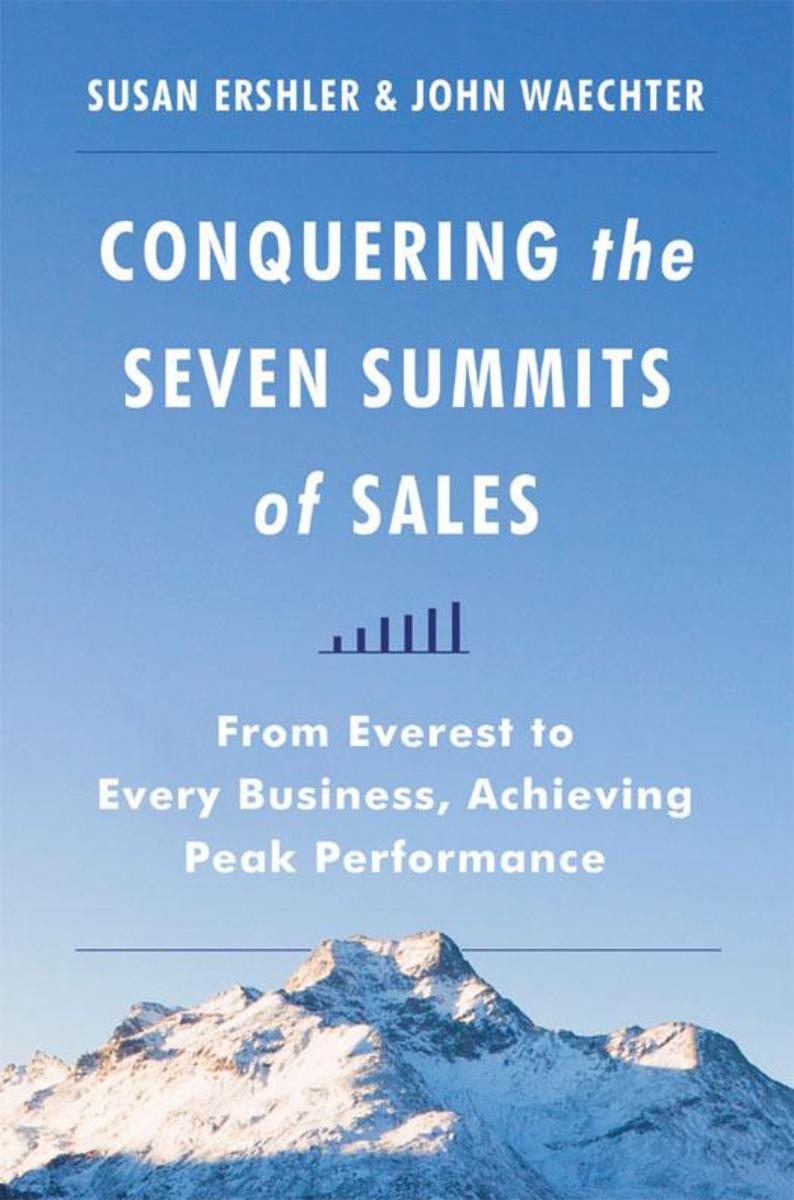
Conquering the Seven Summits of Sales
¥162.29
Two experts who have summited the tallest mountain on each of the seven continents and scaled the highest peaks in corporate sales and business examine what it takes to achieve success.In making the grueling journey to the top of Mount Everest, Susan Ershler and John Waechter joined the elite group of climbers who had conquered the Seven Summits the tallest mountains on each of the seven continents. This same determination has made them star performers in corporate sales and established them as business leaders. And both of them cherish the deep sense of satisfaction that comes from attaining a seemingly impossible goal through focus and persistence.In this unique guide, Susan and John draw on concrete experience to inspire sales professionals as well as all team members to overcome limitations and reach new heights of success, illustrating how anyone can achieve peak performance. They will show you how to define your goals clearly, commit to a vision, "choose the right sherpa" (build the right team), "travel light" (manage time), and "measure the mountain" (track progress).Weaving together stories from harrowing climbs and lessons of indomitable perseverance with actual tested methods for high achievement in sales, business, and life, Conquering the Seven Summits of Sales proves that anyone can overcome limitations and accomplish something real and meaningful in business and in life.
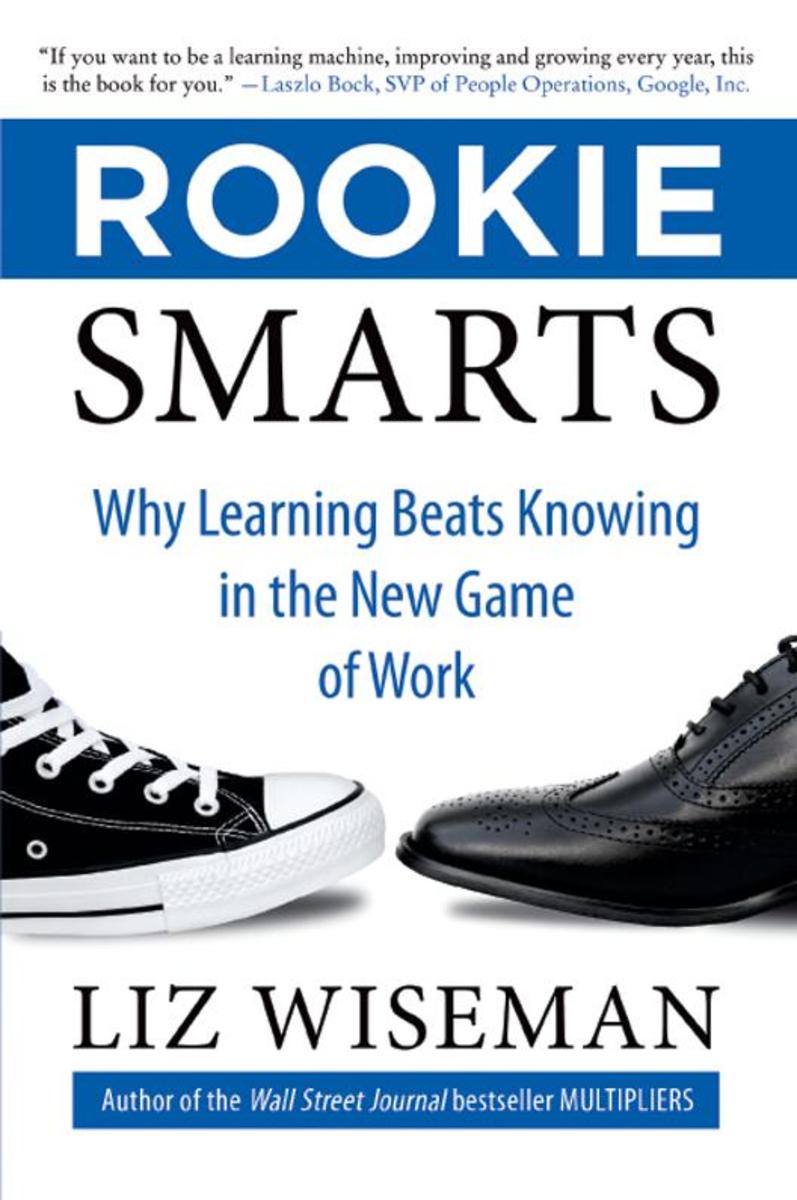
Rookie Smarts
¥162.76
This special digital edition of Rookie Smarts includes 13 videos of leadership expert Liz Wiseman outlining her ground-breaking principles and guiding viewers through exercises that bring fresh perspective, open minds to innovation, and jumpstart a spirit of naive inquiry and constant learning.Is it possible to be at your best even when you are underqualified or doing something for the first timeIs it still possible, even after decades of experience, to recapture the enthusiasm, curiosity, and fearlessness of youth to take on new challengesWith the right mindset with Rookie Smarts you can.In a rapidly changing world, experience can be a curse. Careers stall, innovation stops, and strategies grow stale. Being new, na?ve, and even clueless can be an asset. For today's knowledge workers, constant learning is more valuable than mastery.In this essential guide, leadership expert Liz Wiseman explains how to reclaim and cultivate the curious, flexible, youthful mindset called Rookie Smarts. Wiseman reveals the different modes of the rookie mindset that lead to success: Backpacker: Unencumbered, rookies are more open to new possibilities, ready to explore new terrain, and don't get stuck in yesterday's best practices. Hunter-Gatherer: Rookies seek out experts and return with ideas and resources to address the challenges they face. Firewalker: Lacking situational confidence, rookies take small, calculated steps, moving fast and seeking feedback to stay on track. Pioneer: Keeping things simple and focusing on meeting core needs, rookies improvise and work tirelessly while pushing boundaries. Rookie Smarts addresses the questions every experienced professional faces: Will my knowledge and skills become obsolete and irrelevantWill a young, inexperienced newcomer upend my company or meHow can I keep upThe answer is to stay fresh, keep learning, and know when to think like a rookie.

HarperCollins e-books
¥140.08
Generation Ageless an authoritative and eye-opening look at the past, present, and future of Baby Boomers Think Baby Boomers are all alikeThink again. This dynamic generation is nearing the traditional age of retirement, but is in no mood to slow down. Learn how to market, sell to, do business with, or just understand this remarkable generation, from Yankelovich, Inc., the organization that knows them better than anyone else. Yankelovich actually coined the term "Baby Boomer" back in the late 1960s, when they first started collecting data on this influential generation. Now, more than thirty years later, they have the most complete information on Boomers ever assembled. And they have put it all together in this groundbreaking look at America's largest and most powerful generation. In Generation Ageless, Yankelovich president J. Walker Smith, Ph.D., and senior partner Ann Clurman, Boomers themselves, dig deep into what makes this generation tick. With fresh, original data and a wide-ranging look at everything about Boomers, they dissect Boomers into six major segments Straight Arrows, Due Diligents, Maximizers, Sideliners, Diss/Contenteds, and Re-Activists to provide new insights into the world's most talked-about generation. The results show key imperatives invaluable to anyone selling a product, service, or idea to this 78-million strong group.Boomers are the dominant generation in America. Their values and aspirations set the tone for everyone. Advances in medicine and health mean that this youth-obsessed generation is now focused on an everlasting prime of life. They are literally middle age less: holding onto their position at the top of the pyramid for as long as possible, and not fading away to their golden years. Today's fifty- and sixty-year-old Boomers are not eagerly anticipating lives of disengaged retirement. Instead, middle age less Boomers expect another twenty or thirty years of impact and influence albeit in a variety of ways reflective of a surfeit of agendas and ambitions they have yet to fulfill.

Your Money or Your Life
¥88.56
As the host of Fox News Channel's Your World with Neil Cavuto and Cavuto on Business, Neil Cavuto reports on today's most influential business leaders and newsmakers. His great talent is to get beneath the issues, connecting people to the events that define them and changing the way that Americans think about their money. Ending each show with a provocative, insightful commentary, Cavuto stirs people to see the world in a new light, calling on them to think beyond the stories at hand and challenging people to reevaluate the world that they live in.In Your Money or Your Life, Cavuto compiles the best of these commentaries in one volume, creating a collection that is at once witty, thought-provoking, and inspiring. Covering a variety of topics from remembering life before 9/11, to providing tips for empty nesters Cavuto presents a wry yet evocative look at our world, one that speaks to the heart of the American condition. Spanning one of the most tumultuous decades in memory from the wild and chaotic Clinton years through the sobering challenges of the War on Terror Cavuto's words offer a window into our America at its best and its worst.
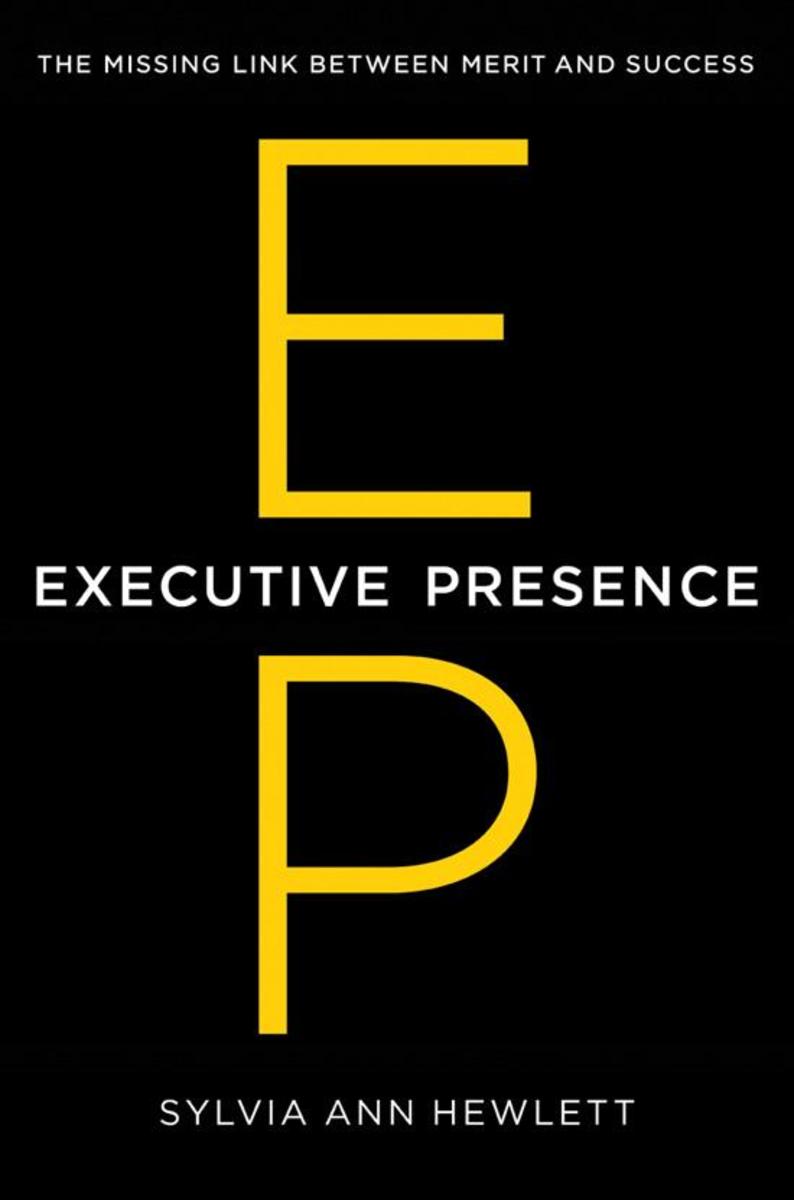
Executive Presence
¥157.15
Do you exude confidence and credibilityCan you command a roomSylvia Ann Hewlett, one of the world's most influential business thinkers, cracks the code of Executive Presence (EP) for men and women intent on winning the next plum assignment and doing something extraordinary with their lives.You might have the qualifications to be considered for your dream job, but you won't get far unless you can signal that you're "leadership material" and that you "have what it takes." Professionals are judged on presence as well as on performance. Using a wealth of hard data including a new nationwide survey and dozens of focus groups Hewlett reveals EP to be a dynamic mix of three things: how you act (gravitas), how you speak (communication), and how you look (appearance). She also draws on in-depth interviews with a wide selection of admired leaders to reveal how they embody and deploy key elements of EP.This book is immensely practical. Hewlett teases out tactics that can help you raise your game and close the gap between merit and success. She offers the unvarnished advice you won't get from supportive friends and tackles head-on such touchy subjects as too-tight clothing and too-shrill voices. She shows how the standards for EP vary for men, women, multicultural, and LGBT employees, and she shares how to get meaningful feedback from politically correct bosses intent on avoiding the real issues.The good news is that EP is eminently teachable. You can learn how to "show teeth" while remaining likable, and you can teach yourself how to dress appropriately while staying true to yourself. You don't have to be born with the voice of James Earl Jones or the looks of Angelina Jolie to hurdle the EP bar. With hard facts and vivid examples, Hewlett shows you how to ace EP and fully realize your unique potential no matter who you are, no matter where you work.
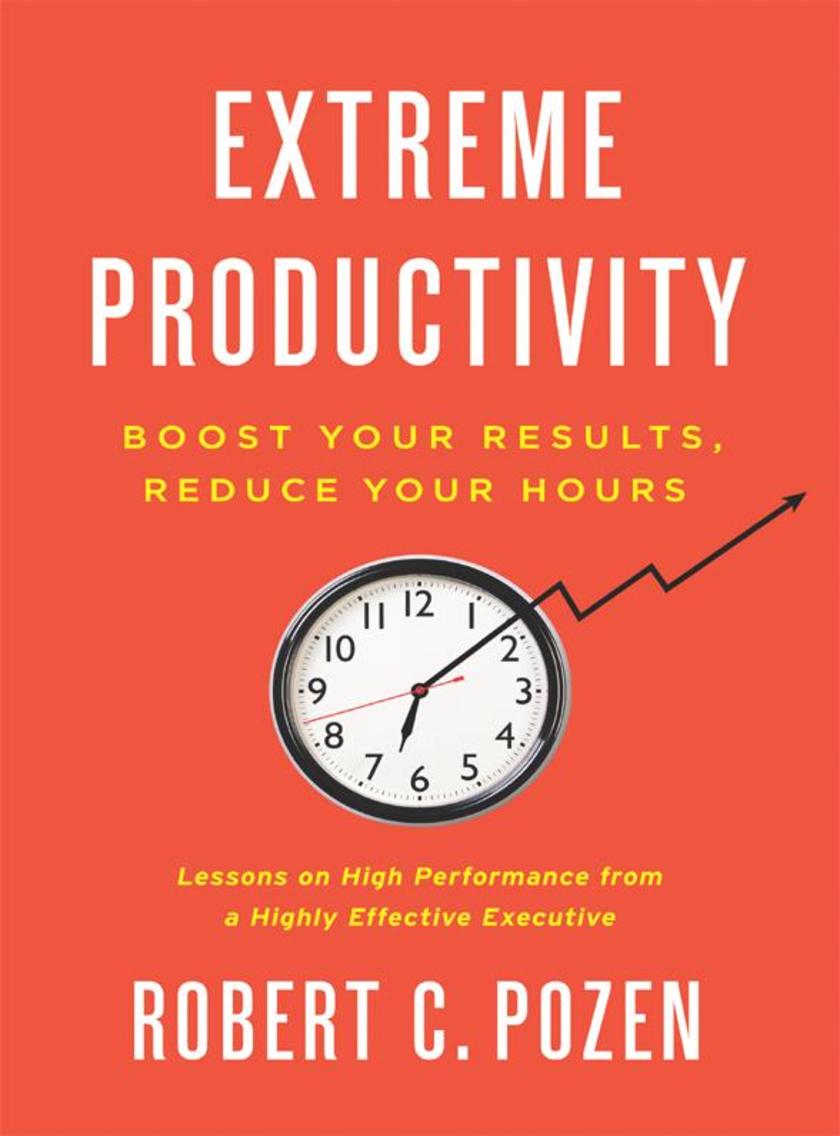
Extreme Productivity
¥155.02
A road-tested formula for improving your performance, from one of the business world's most successful and productive executives. Robert C. Pozen taught a full course load at Harvard Business School while serving as the full-time chairman of a global financial-services firm. He's written six books and hundreds of articles, raised a family with his wife of more than four decades, and served on many boards of local charities and public companies. Pozen is a prince of productivity, a man who has worked smarter and faster than almost everyone around him for more than forty years.In Extreme Productivity, Pozen reveals the secrets to workplace productivity and high performance. His book is for anyone feeling overwhelmed by an existing workload facing myriad competing demands and multiple time-sensitive projects. Offering antidotes to a calendar full of boring meetings and a backlog of e-mails, Extreme Productivity explains how to determine your highest priorities and match them with how you actually spend your time. Pozen shows that in order to be truly productive, professionals must make a critical shift in their mind-set: from hours worked to results produced. He helps people at all stages of their careers read, write, and make presentations quicker and more effectively. He provides professionals with practical tips on how to efficiently use their time in the office while leading full and productive personal lives as well.
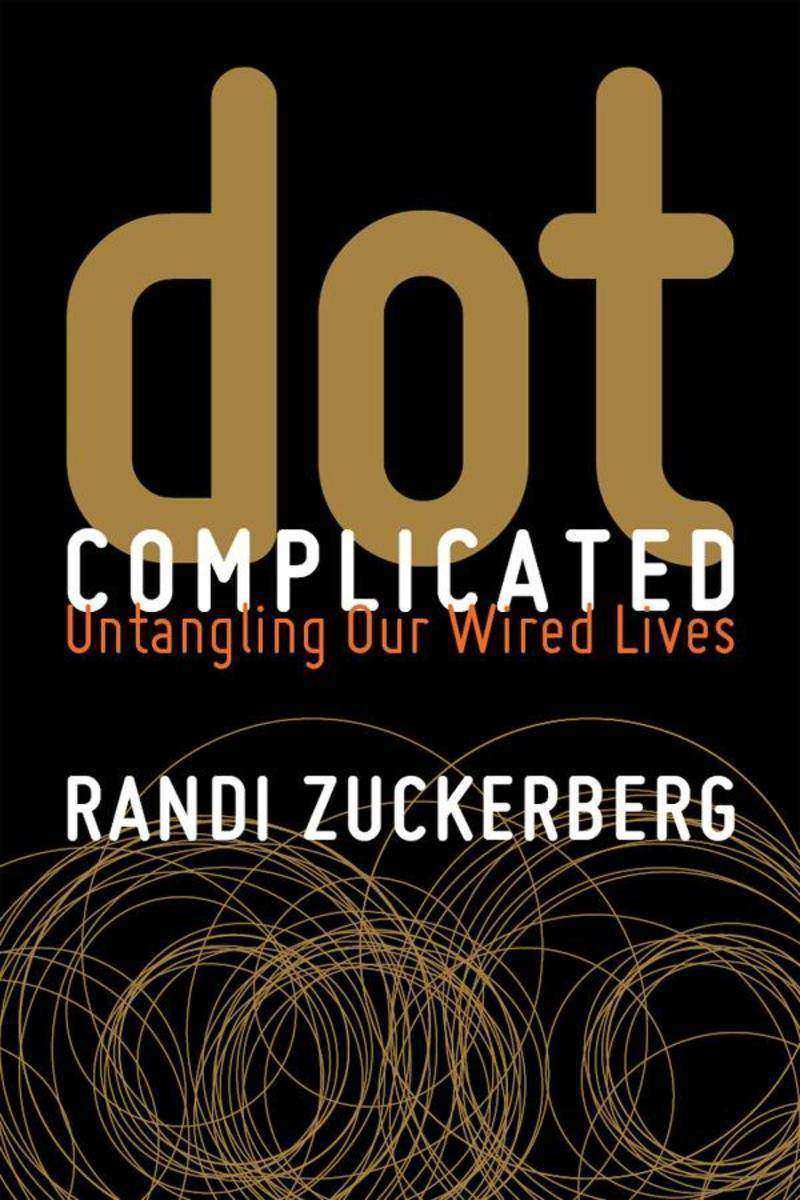
Dot Complicated
¥156.69
From Randi Zuckerberg, social media and technology expert and former marketing executive at Facebook, comes a welcome, essential guide to understanding social media and technology and how they influence and inform our lives online and off.Technology and social media have changed, enhanced, and complicated every facet of our lives from how we interact with our friends to how we elect presidents, from how we manage our careers to how we support important causes, from how we find love to how we raise our children.The technology revolution is not going away. We can't hide from it or pretend that it's not changing our lives in a thousand different ways. So how do we dealIn Dot Complicated, Randi Zuckerberg shows us. Through first hand accounts of her time at Facebook and beyond, where Zuckerberg witnessed this remarkable shift, she details the opportunities and obstacles, problems and solutions, to this new online reality. In the process, she establishes rules to bring some much-needed order and clarity to our connected, complicated, and constantly changing lives online.The Internet, social networks, and smartphones,Zuckerberg writes, have given us amazing new tools and ways of communicating, collaborating, and living with one another. We can use new technology to understand and solve some very old challenges that individuals and communities around the world have faced since long before Facebook, or anything like it, existed.Invaluable, timely, and engaging, Dot Complicated reveals how to make it through your life online in one piece from the etiquette of unfriending and the power of crowdsourcing to the perils of photo tags and the importance of teaching your kids how to be tech savvy.

HarperCollins e-books
¥90.73
There is no doubt that we are in the middle of a transition to a knowledge-based economy. Breakthrough technologies in microelectronics, biotechnology, new materials, telecommunications, robotics, and computers are fundamentally changing the game of creating wealth. While these new industries are growing explosively, existing industries such as banking and retail are being transformed beyond recognition. As a result, a new global economy is emerging to replace existing national economies.What will it take for individuals, companies, and entire countries to succeed in the new economics of the twenty-first centuryRather than focusing on spending, Lester C. Thurow argues that we must emphasize investment in basic knowledge, education, and infrastructure. Only by committing ourselves to building communal wealth can we maximize opportunities for building personal wealth as well. Building Wealth is an indispensable guide to surviving -- and thriving -- in the economies of the twenty-first century.

HarperCollins e-books
¥145.97
The commercial and cultural explosion of the digital age may have been born in California's Silicon Valley, but it reached its high point of riotous, chaotic exuberance in New York City from 1995 to 2000 in the golden age of Silicon Alley. In that short stretch of time a generation of talented, untested twentysomethings deluged the city, launching thousands of new Internet ventures and attracting billions of dollars in investment capital. Many of these young entrepreneurs were entranced by the infinite promise of the new media; others seemed more captivated by the promise of infinite profits. The innovations they launched from online advertising to 24-hour Webcasting propelled both the Internet and the tech-stock boom of the late '90s. And in doing so they sent the city around them into a maelstrom of brainstorming, code-writing, fundraising, drugs, sex, and frenzied hype . . .until April 2000, when the NASDAQ zeppelin finally burst and fell at their feet. In the pages of Digital Hustlers, Alley insiders Casey Kait and Stephen Weiss have captured the excitement and excesses of this remarkable moment in time. Weaving together the voices of more than fifty of the industry's leading characters, this extraordinary oral history offers a ground-zero look at the birth of a new medium. Here are entrepreneurs like Kevin O'Connor of DoubleClick, Fernando Espuelas of StarMedia, and Craig Kanarick of Razorfish; commentators like Omar Wasow of MSNBC and Jason McCabe Calacanis of the Silicon Alley Reporter; and inimitable Alley characters like party diva Courtney Pulitzer and Josh Harris, the clown prince of Pseudo.com. Together they describe a world of sweatshop programmers and paper millionaires, of cocktail-napkin business plans and billion-dollar IPOs, of spectacular successes and flame-outs alike. Candid and open-eyed, bristling with energy and argument, Digital Hustlers is an unforgettable group portrait of a wildly creative culture caught in the headlights of achievement.

The Gifted Boss
¥112.28
Want freedom from management, mediocrity and moronsEver wonder what the best bosses know that you don'tDo you want to have great employees, people who don't need to be managed and who make everyone around them work harder and raise the department to a higher standardThe Gifted Boss is management guru Dale Dauten's classic yet revolutionary guidebook on teaching managers how to spot and court talent and how to give great employees what they want and need. This is a comprehensive system full of valuable insight and lessons aimed at creating the best work environment for the best people. Throughout The Gifted Boss, Dale Dauten defines his different breed of leader as one who is able to shape a business environment and culture that is a magnet for self-motivated employees. Dauten's starting point is a powerful fact about hiring great employees: the best ones are almost never in the job market. His system also includes a discussion of "ideal turnover" and how the great managers employ "the secret skill" of "de-hiring" to gracefully move mediocre employees up or out. Throughout his discussions, Dauten incorporates priceless knowledge gained from an exhaustive search for America's best bosses. The wisdom he acquired was startling, and it pertained to every type of organization: "Different isn't always better, but better is always different." The Gifted Boss has already earned itself a cult following. Now, based on conversations with hundreds of readers, Dauten has revised his work by adding a quick-start guide to help his audience get fast results and a discussion guide to help executives share the book with their teams. Though new technology continues to bring new changes to communication in the workplace, The Gifted Boss still remains the essential guide to maneuvering the tricky world of managing the modern employee. It belongs on every businessperson's desk.




 购物车
购物车 个人中心
个人中心



